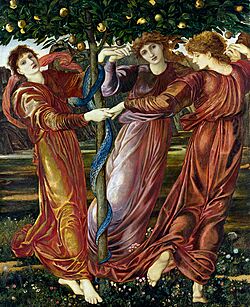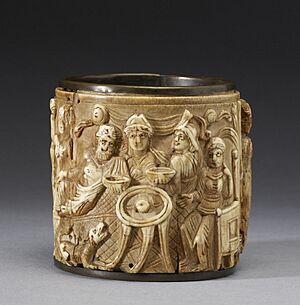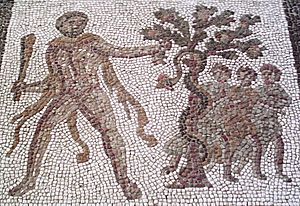Hesperides facts for kids
Quick facts for kids The Hesperides |
|
|---|---|
| Nymphs of the West | |

Garden Hesperides by Edward Burne-Jones
|
|
| Other names | Atlantides |
| Abode | Hesperia |
| Parents | Various |
In Greek mythology, the Hesperides are special nymphs. They are known as the "Daughters of the Evening" or "Nymphs of the West" because they are linked to the evening and the golden light of sunsets. Sometimes, they are also called the Atlantides, named after their father, Atlas.
Contents
Who Were the Hesperides?
The Hesperides are often described as the daughters of Night (Nyx), sometimes with Darkness (Erebus). Other stories say their parents were Atlas and Hesperis, or Phorcys and Ceto. In some Roman stories, they are simply the daughters of Hesperus, who represents the "west."
The number of Hesperides also changes in different myths. Some stories mention three, while others say there were four or even seven. Their names also vary, but some common ones include Aegle, Erytheia, and Hesperia.
The Magical Garden of the Hesperides
The Hesperides lived in a beautiful, blissful garden located far to the west. This garden was near the Atlas Mountains in North Africa, right at the edge of the Oceanus, which was believed to be the world ocean. Some ancient writers thought the garden was in Lixus, Morocco. Other stories place it in Tartessos, a region in southern Spain.
Over time, the Garden of the Hesperides became more of a poetic idea than a religious one. It was often mentioned in poems during the Renaissance period.
The Golden Apples
The Garden of the Hesperides was Hera's special orchard. It had a tree or a grove of trees that grew amazing golden apples. The legend says that when Zeus and Hera got married, the goddess Gaia gave Hera branches with golden apples as a wedding gift. Hera loved them so much that she asked Gaia to plant them in her gardens, which stretched all the way to Mount Atlas.
The Hesperides were given the important job of looking after this grove. However, Hera didn't fully trust them, so she also placed a powerful, never-sleeping, hundred-headed dragon named Ladon in the garden to guard the apples.
These golden apples are famous in other myths too. In the story of the Judgement of Paris, Eris, the Goddess of Discord, took one of these apples, known as the Apple of Discord, which eventually led to the famous Trojan War.
Some people in later years thought that these "golden apples" might have actually been oranges. Oranges were not known in Europe until the Middle Ages. Because of this idea, the Greek name for all citrus fruits became Hesperidoeidē, meaning "hesperidoids." Even today, the Greek word for orange is portokáli, named after Portugal, a country in Iberia near where the Garden of the Hesperides was thought to be.
Heracles and the Golden Apples
After Heracles finished his first ten difficult tasks, called Labours, King Eurystheus gave him two more. One of these extra tasks was to steal the golden apples from the Garden of the Hesperides.
Heracles first had to find out where the garden was. He caught the Old Man of the Sea, a sea god who could change his shape, to get directions. In some stories, Heracles went to the Caucasus Mountains and freed Prometheus from his daily torture. Prometheus then told Heracles how to find the garden and what dangers he might face.
Tricking Atlas
When Heracles finally reached the Garden of the Hesperides, he found Atlas holding up the heavens. Heracles came up with a clever plan: he offered to hold up the heavens for a short time if Atlas would go and get the golden apples for him. Atlas, who was either the father or a relative of the Hesperides, was able to get the apples.
When Atlas returned, he decided he didn't want to take the heavens back. He offered to deliver the apples himself. But Heracles tricked him again! He agreed, but asked Atlas to hold the heavens just for a moment so he could adjust his cloak to be more comfortable. Atlas agreed, and as soon as he took the heavens back, Heracles grabbed the apples and walked away.
In another version of the story, Heracles didn't trick Atlas. Instead, he fought and killed the dragon Ladon himself and then took the apples. After Heracles stole the apples, the goddess Athena later returned them to their rightful place in the garden.
Argonauts' Visit
After Heracles had taken the golden apples, the Argonauts, a group of heroes on their own journey, arrived at the Hesperian plain the next day. They were very thirsty and asked the Hesperides for help finding water. The kind goddesses felt sorry for the young men and showed them a spring. This spring had been created by Heracles himself, who had also been thirsty and struck a rock near Lake Triton, causing water to gush out.
Different Ideas About the Golden Apples
One ancient writer, Diodorus, had a different idea about the Hesperides and their "golden apples." He said that the Hesperides didn't actually have golden apples. Instead, they owned very beautiful flocks of sheep. These sheep were so lovely that poets called them "golden apples" because of their beauty, just like the goddess Aphrodite was called "golden." Others thought the sheep had a special golden color. This version of the story also says that the "dragon" Ladon was actually the name of the shepherd who guarded these sheep. He was a very strong and brave man who would kill anyone who tried to steal the sheep.
Images for kids
-
Landschaft mit dem Garten des Hesperides by J. M. W. Turner
See also
 In Spanish: Hespérides para niños
In Spanish: Hespérides para niños
- Avalon
- Cedar Forest
- Fortunate Isles
- Garden of Eden
- Golden apple
- Immortality
- Hesperis or Hesperius
- Hesperos or Hesperus
- Hesperium
- Paradise







